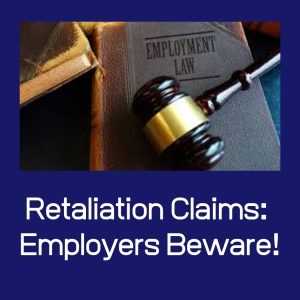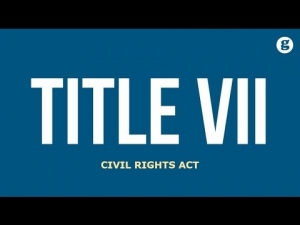A Tale of Two Statutes: What are Compensable “Hours Worked”?
A recent decision by the Pennsylvania Supreme Court underscores the fact that although an employer may be in compliance with the federal Fair Labor Standards Act (“FLSA”), it may at the same time be in violation of the Pennsylvania Minimum Wage Act (“PMWA”).
The case, In Re: Amazon.Com, Inc. et al. v. Amazon.com, Inc., Amazon.com.DEDC, LLC, and Integrity Staffing Solutions, Inc. (43 EAP 2019), involved a class action brought by two employees who worked at an Amazon warehouse in Pennsylvania and sought to be compensated for time spent at the premises waiting to undergo and undergoing mandatory security screening.
As discussed below, a federal district court had dismissed the employees’ claims under the FLSA and the PMWA, but the federal Sixth Circuit Court of Appeals certified the case to the Pennsylvania Supreme Court to address the questions as to whether the PMWA applied to the employees’ claims and whether there is a de minimus exception to the PMWA.
Van Buren v. United States: The Supreme Court Eliminates a Remedy for Employers
Reprinted with permission from the June 21st edition of The Legal Intelligencer. (c) 2021 ALM Media Properties. Further duplication without permission is prohibited.
Since its enactment in 1986, employers have used the federal Computer Fraud and Abuse Act, 19 U.S.C. §1030 (“CFAA”) to vindicate violations of the employer’s workplace policies regarding use of computers, email accounts, and other electronic information by departing employees. The CFAA inevitably appeared as a claim in an employer’s complaint to address such conduct as downloading information from work computers and email accounts, or wiping devices and removing valuable information. The CFAA potentially provided relief where the information taken might not meet the definition of a “trade secret” in the federal Defend Trade Secrets Act (18 U.S.C. §1986), or Pennsylvania’s Uniform Trade Secrets Protection Act (12 P.S. § 5302). Further, and perhaps providing leverage for employers, the CFAA provided a criminal remedy for such violations. In Van Buren v. United States, 592 U.S. ___ (June 3, 2021), the United States Supreme Court may have eliminated that claim for wronged employers.
The CFAA prohibits intentionally accessing a computer with or without authorization or exceeding authorized access of a computer. The Act defines “exceeding authorized access” as accessing a computer with authorization and using that access to obtain information in the computer to which the individual is not otherwise entitled. The CFAA imposes criminal liability for violations of these prohibitions. It also imposes civil liability through a private cause of action if there is “damage,” meaning, an impairment to the integrity or availability of data, a program, a system or information.
Pandemic Challenges for Employers
Reprinted with permission from Lower Bucks Chamber of Commerce Outlook Magazine, July/August 2021 Edition
The pandemic changed the workplace dramatically, and perhaps permanently. COVID called upon employers to adapt to remote work with very little notice and preparation. Employers then adapted their offices and workspaces to allow employees to work safely in their facilities with masks and social distancing. And then, just as quickly, CDC modified its masking guidance. Employers are challenged to comply with changing guidelines and existing laws and a very competitive job market. Employers must consider new masking guidelines, vaccination mandates and remote work options, as well as the laws that apply to those considerations.
When the pandemic started, CDC guidelines presented a simple rule: In-person workplaces should require employees to wear masks, unless there was a health reason that prevented an employee from doing so. If an employee had a health reason not to mask, the employer could comply with the Americans with Disabilities Act, and the Pennsylvania Human Relations Act, by accommodating the employee who provided medical documentation of the health issue. The CDC recently changed its guidance to state that vaccinated people do not need to wear masks, and this is where it gets complicated.
NAVIGATING THE NEW COBRA SUBSIDY
Reprinted with permission from the April 16th edition of The Legal Intelligencer. (c) 2021 ALM Media Properties. Further duplication without permission is prohibited.
The American Rescue Plan Act of 2021 (ARPA), among other significant items, imposed new obligations for employers pursuant to the Consolidated Omnibus Reconciliation Act (“COBRA”). Specifically, ARPA requires employers to provide COBRA premium subsidies to certain employees from April 1, 2020 through September 30, 2021. The requirement comes with complicating definitions, retroactivity provisions, and new forms, creating a temporary compliance issue for employers. On April 7, 2021, the United States Department of Labor issued Model Notices and “FAQ’s” to assist with these compliance issues.
The COBRA subsidy is available from April 1, 2021 to September 30, 2021 to “assistance eligible individuals,” that is, individuals who are eligible for COBRA coverage as a result of an involuntary termination or a reduction in hours. The Act specifically excludes individuals who voluntarily terminate their employment. “Assistance eligible individuals” are not required to pay their COBRA premiums from April 1, 2021 through September 30, 2021. The employer or plan to whom the individual would normally pay premiums is entitled to a Medicare tax credit for the amount of the premium assistance. There is no guidance from the Department of Labor or the Internal Revenue Service regarding these tax credits.
The Third Circuit Addresses Employment Discrimination Cases
Reprinted with permission from the February 22nd edition of The Legal Intelligencer. (c) 2021 ALM Media Properties. Further duplication without permission is prohibited.
In Martinez v. UPMC Susquehanna, the United States Court of Appeals for the Third Circuit clarified the specificity required in pleading prima facie cases of discrimination in light of the holdings in Ashcroft v. Iqbal, 556 U.S. 662 (2009) and Bell Atlantic Corp. v. Twombly, 550 U.S. 544 (2007). The Third Circuit held that an age discrimination plaintiff need not plead the exact age or duties of the plaintiff’s alleged replacement in order to survive a motion to dismiss.
The plaintiff in the Martinez case appealed an order issued by the United States District Court for the Middle District of Pennsylvania dismissing the case for failure to state a claim under Iqbal and Twombly. The defendant, UPMC Susquehanna, employed the plaintiff, Dr. Martinez, as an orthopedic surgeon. Dr Martinez alleged in his complaint that UPMC Susquehanna terminated his employment and advised him that it was “moving in a different direction and his services were no longer needed.” UPMC Susquehanna also told Dr. Martinez that his termination had “nothing to do with his performance.” Dr. Martinez pleaded that he was seventy (70) years old, and that UPMC Susquehanna hired two doctors after his termination. The Complaint alleged that one of the hired physicians took over some of Dr. Martinez’s job duties, and that the second doctor was hired in response to a job posting for an orthopedic surgeon. Relevant to the Court’s analysis, Dr. Martinez alleged that both doctors were “significantly younger”, “less qualified,” and “less experienced” than Dr. Martinez.
Supreme Court Expands Title VII Protections to Prohibit Discrimination on the Basis of Sexual Orientation and Gender Identification
Reprinted with permission from the June 19th edition of The Legal Intelligencer. (c) 2020 ALM Media Properties. Further duplication without permission is prohibited.
The Supreme Court of the United States held in Bostock v. Clayton County, Georgia, 590 U.S. ___ (US 2020) that Title VII’s prohibition against discrimination on the basis of sex also bars discrimination on the basis of sexual orientation and gender identity. The Court’s opinion relies on the text of the statute, rejecting arguments from employers regarding the failure to specifically include gender identity or sexual orientation in the statue. The Supreme Court’s decision in Bostock is historic – it expands the protections of Title VII to sexual orientation and gender identity, protections previously denied. The Court’s ruling requires employers to update and modernize their policies and procedures, hiring practices, training and workplace culture.
RETALIATION CLAIMS: EMPLOYERS BEWARE!
Most employers these days are aware of the many workplace claims an employee might bring, including allegations of discrimination on account of race, color, religion, sex, national origin, sexual orientation, pay, age, or disability. Among other claims are those brought under the Fair Labor Standards Act (minimum wage, overtime) and the Family Medical Leave Act.
Employers paradoxically seem less aware of a retaliation claim an employee may bring. Paradoxically, because as reported by the Equal Employment Opportunity Commission (“EEOC”-the federal agency responsible for enforcing laws prohibiting employment discrimination), retaliation claims constituted the highest percentage of all charges filed in its fiscal year 2019.
Moreover, as discussed below, retaliation claims, by which an employee can obtain the same remedies as discrimination claims, are often easier for an employee to prove.
A recent opinion by the United States Court of Appeals for the Third Circuit (covering Pennsylvania) illustrates what an employee must do to state a case for retaliation and how an employer might defend the action.
Attention Employers: New Department of Labor Ruling on Overtime Pay
On September 24, 2019, the United States Department of Labor announced a new final rule regarding eligibility for overtime pay. The rule requires employers to revisit their classifications of employees as exempt in order to ensure compliance.
As I discussed in previous articles (Texas Federal Judge Blocks New Overtime Rules and Speaking of Overtime Rules and One Final Overtime Update) the DOL announced rules in 2016 to dramatically increase the salary threshold in order for certain categories of employees to meet the standards for exemption from federal overtime requirements. The rules were met with litigation and a stay of their enforcement.
The new final rule raises the salary threshold from $455 a week to $684 a week, or $35,568 a year. Employers may now use nondiscretionary bonuses and incentive payments, such as commissions to satisfy up to 10% of the salary level. Employees will still have to meet requirements related to their duties in order to meet the standards of exemption for the overtime requirements.
This final rule will become effective on January 1, 2020. As we advised in 2016, employers should take steps to ensure compliance by the end of the year. The first step is to identify any employees who are classified as exempt but are making less than $422 a week, and develop a plan to reclassify those employees, or revise their compensation. This is a good time to revisit the job duties of those employees to ensure that they meet the applicable standards for exemption in terms of their duties as well as their salary. This is also a good time to review overtime policies to ensure appropriate recordkeeping, efficient use of overtime and compliance with applicable law.
AMM can help employers navigate these new rules and review their employee classifications to ensure compliance and minimize risk.
No Hire Clause Called into Question
Many companies use restrictive covenant agreements with key employees to guard against economic harm to the company by an employee who takes a job with the company’s competitor and/or tries to persuade the company’s customers to stop doing business with the company. These are particularly common with sales staff. In Pennsylvania, these covenants will generally be upheld if they are narrowly drawn to protect the employer’s legitimate business interests and if the employee has been given meaningful consideration in exchange for agreeing to be bound by the covenants. To learn more about Noncompetes, visit our Navigating Noncompetes blog series in the AMM Employment Law Blog.
Companies recognize that merely doing business with other firms can also be risky when it comes to protecting their interests in employees and customers. Consequently, it has become customary to include “no hire” provisions in contracts to prohibit a party from hiring away the other party’s staff. These clauses are particularly common in agreements in the technology field and in non-disclosure agreements that parties often enter into when evaluating whether or not to begin a business relationship. The viability of these provisions is in doubt in Pennsylvania, where the Pennsylvania Superior Court struck down a no-hire clause in a service agreement earlier this year. The Pennsylvania Supreme Court has agreed to hear the case.
In Pittsburgh Logistics Systems, Inc. v. BeeMac Trucking, LLC, the trial court held that the no-hire clause was unenforceable because it prevented individuals from seeking employment with certain companies even though those individuals had not agreed to or been compensated for the restriction. It is important to note that in a separate action, Pittsburgh Logistics Systems (“PLS”), the company attempting to enforce the restrictions against BeeMac, was unsuccessful in its efforts to enforce the restrictive covenants contained in four employees’ employment agreements, each of whom left to work at BeeMac. The trial court concluded that the covenant not to compete was oppressive and overly broad since it had an unlimited geographic scope. The court viewed PLS as having “unclean hands” and refused to enforce the restriction at all.
The Superior Court agreed with the trial court and held that the no-hire clause was unenforceable as a matter of law. The Superior Court was influenced by the lower court’s holding that the non-compete covenants in the employment agreements were not enforceable, noting that it would be unfair for PLS to achieve the same result by using a contractual no-hire provision in its contracts with other companies.
Two Superior Court judges dissented, drawing a distinction between a no-hire provision in a contract between two companies and a non-compete clause binding employees. They reasoned that the no-hire clause did not restrict the employees’ actions; rather, the clause was a bargained-for restriction in recognition of the fact that BeeMac would have access to PLS employees and know-how. The dissenting opinion suggests that the correct analysis is whether the no-hire clause was a reasonable restraint on trade. Using that test, the dissenting judges would have enforced the clause and granted the injunctive relief requested by PLS to prevent BeeMac from “enjoy[ing] the benefit of its purported breach” and “leverag[ing] the specialized knowledge that PLS’s former employees acquired while under its employment.”
It will be interesting to see how the Pennsylvania Supreme Court views these issues when it hears this case. Stay tuned for further developments.
Supreme Court Finds Title VII’S Requirement to File a Charge of Discrimination is not Jurisdictional
Reprinted with permission from the June 21st edition of The Legal Intelligencer. (c) 2019 ALM Media Properties. Further duplication without permission is prohibited.
In Fort Bend County v. Davis, 587 U.S. ___ (2019), the Court held that the requirement that a plaintiff in an employment discrimination case brought under Title VII, 42 U.S.C. § 2000e, et seq, file a charge of discrimination with the Equal Employment Opportunity Commission (“EEOC”) prior to filing a complaint in court is a procedural and not a jurisdiction requirement. Therefore, an employer’s failure to assert the absence of an appropriate charge of discrimination in a motion to dismiss results in a waiver of the defense. The Supreme Court’s decision resolves a split in the circuits regarding whether the requirement is jurisdictional, and highlighted the importance of the charge of discrimination and the motion to dismiss in employment discrimination cases.




























